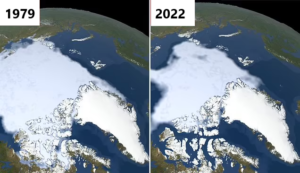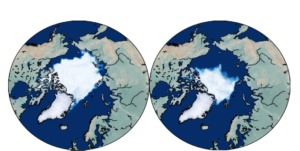On September 19, 2023, NASA’s satellite data revealed that the Arctic experienced its sixth-lowest minimum ice extent on record, while the Antarctic saw its smallest maximum ice coverage ever recorded. This ongoing trend, although not new, appears to be worsening over time.
Since NASA began its satellite observations in 1978, Arctic sea ice has been steadily decreasing. Recent analyzes suggest that the Arctic could potentially face ice-free conditions in September by the 2020s or 2030s.

However, it’s essential to note that “ice-free” doesn’t mean a complete absence of ice; rather, it refers to having less than a million square kilometers of ice coverage.
Even during the minimum ice extent of 2023, Arctic sea ice covered 1.63 million square miles or 4.23 million square kilometers. Projections indicate that by the 2030s, the summer ice in the Arctic could shrink to approximately 24 percent of its 2023 size, regardless of different emission scenarios.
However, “ice-free” doesn’t mean complete absence; it refers to less than a million square kilometers of ice coverage.
Even during the 2023 minimum, Arctic sea ice covered 1.63 million square miles or 4.23 million square kilometers. Predictions indicate that by the 2030s, summer ice in the Arctic couId shrink to about 24 percent of its 2023 size, regardless of emission scenarios.

Scientists expect this decline to continue, with ice-free conditions becoming more frequent in the Arctic by 2067, extending beyond just September to include August and October. However, reducing greenhouse gas emissions could delay this milestone. Arctic ice melting is highly sensitive to carbon emission fluctuations, suggesting that emission reductions could prevent prolonged ice-free periods.
The study, published in Nature Reviews Earth & Environment, underscores the significant impact of these changes. Lead author Alexandra Jahn, an associate professor at CU Boulder’s Institute of Arctic and Alpine Research, emphasizes the urgency of emission reduction efforts. Even inevitable ice-free conditions require minimizing emissions to prevent prolonged ice-free periods.
These projections are based on comprehensive analyzes combining various research findings, highlighting significant consequences, especially for wildlife relying on sea ice. Polar bears, for example, face increasing challenges as their habitat shrinks.

As Arctic ice diminishes, it also opens up easier navigation routes for shipping, potentially benefiting commercial interests but posing new challenges for marine mammaIs like blue whales.
Additionally, melting Arctic ice exacerbates global warming by reducing the earth’s albedo effect. Less ice cover means less reflective surface to bounce sunlight back into space, accelerating melting and amplifying oceanic heat absorption. This feedback loop intensifies the frequency and severity of heat waves, perpetuating a cycle of warming and melting.
Despite these alarming projections, there is hope in the Arctic’s ability to respond to climate change. Unlike long-term geological processes such as glacier formation, Arctic sea ice can regenerate relatively quickly if emissions are reduced. This highlights the importance of swift action to mitigate climate change and protect the Arctic’s ecological balance..





